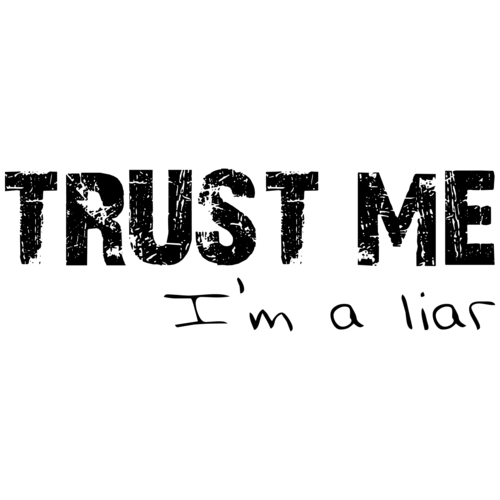
This article is my own intellectual property and is originally published via Steemit.
The level of irony that legacy press figures prove blind to in their own statements can be downright astonishing.
Disobedient Media recently discussed the travesty of an article published by The Guardian, which claimed former Trump campaign manager Paul Manafort had visited WikiLeaks co-founder Julian Assange in the Ecuadorian embassy in London numerous times, including a trip in the spring of 2016. The trouble was, the paper provided no evidence whatsoever to back its claim, and a great bucketload of evidence quickly contradicted the paper's claims.
The backlash was so severe, that Politico allowed an anonymous "ex" CIA officer to pen an article blaming the lies of Luke Harding and Dan Collyns on - you guessed it - the Russians. Matt Taibi of Rolling Stone was quick to pounce on the move, saying: "We've gone from unnamed sources to unnamed authors.":
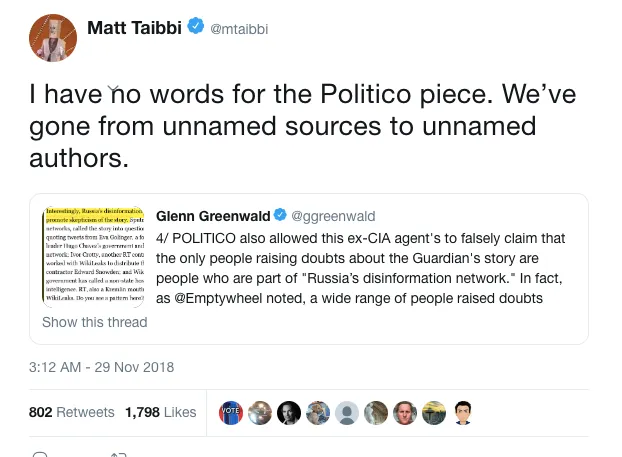
The Guardian's debacle was not the first time it had been burned by Harding, who in addition to accusations of plagiarism, previously published a smear against Assange, using source Fernando Villavicencio of FocusEcuador - despite the fact that Villavicencio had a history of publishing forged documents in the Guardian.
The litany of other issues with Luke Harding's credibility - as well as that of the Guardian - could provide enough subject material for an entire book. However, it is worth noting that in the wake of The Guardian's attempt to conflate Russiagate with Assange's impending prosecution, a spotlight has also been cast on The Guardian fixture Carole Cadwalladr.
Cadwalladr is a journalist with The Guardian and a staunch Russiagate proponent.
While recently reviewing the social media profiles for both Harding and Cadwalladr, this writer noted one of the most appalling examples of unintentional irony I've come across in my time as an independent journalist. Less than a month before The Guardian would publish Harding's claptrap of a smear on Assange, Cadwalladr posted the following screed via Twitter, where it was also retweeted by Harding:
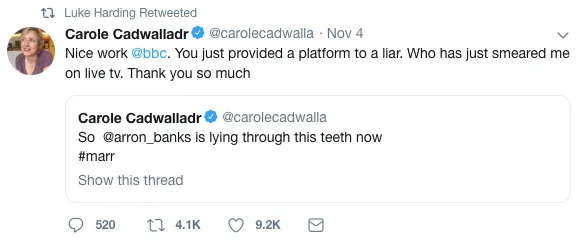
In the jaw-dropping post, Cadwalladr criticizes the BBC for "giving a platform to a liar," which, as most readers are aware, is precisely what the Guardian went on to provide yet again to serial-liar Luke Harding. It would be hilarious if the stakes involved weren't so deadly serious.
This writer couldn't help but respond to such idiocy:
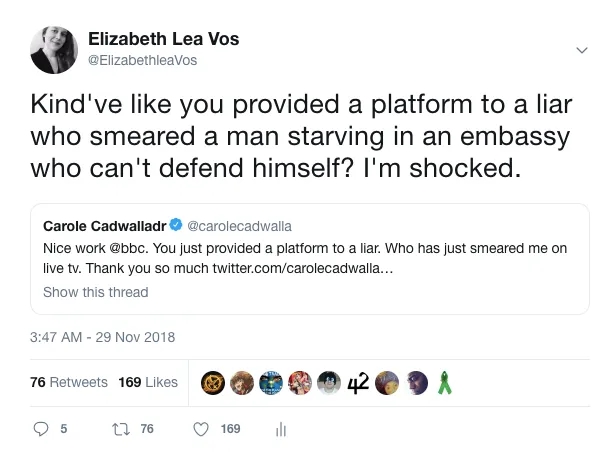
The straight-faced irony of Cadwalladr's statement is amplified further by the observation of independent journalist Caitlin Johnstone, who pointed out that it had been a full week since the journalist had lied about the location of a photograph of Dana Rohrabacher allegedly meeting with Tommy Robinson, claiming he was pictured on the steps of the Ecuadorian Embassy, before admitting this was false but failing to delete the tweet for seven days.
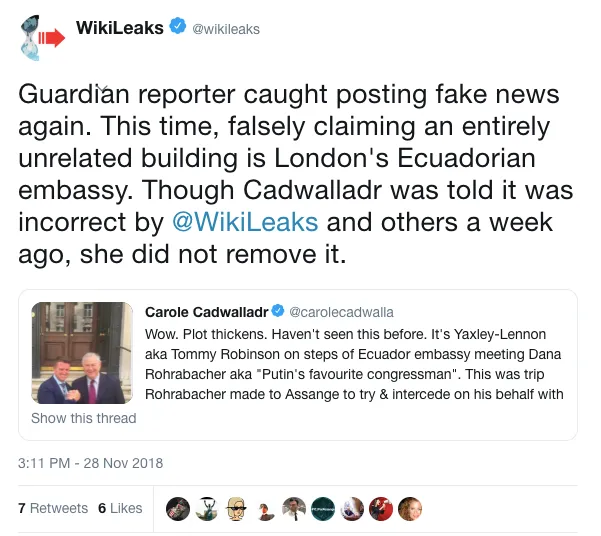
Cadwalladr pivoted from this blatant inaccuracy, claiming the image was taken "... shortly before/after he met with Assange. On a different set of steps."
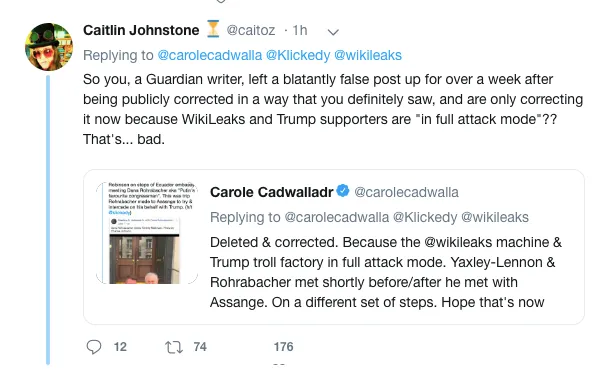
Again: Cadwalladr, an award-winning journalist only deleted the offending tweet one week after publishing it, not due to the fact that it was a lie, but because she had been "attacked" by Trump and WikiLeaks supporters.
Cry me a river, Carole.
Meanwhile, thanks to the intrepid reporting of Stefania Maurizi of la Repubblica, the public has learned that Assange has been starved. Maurizi Tweeted the following just days ago:
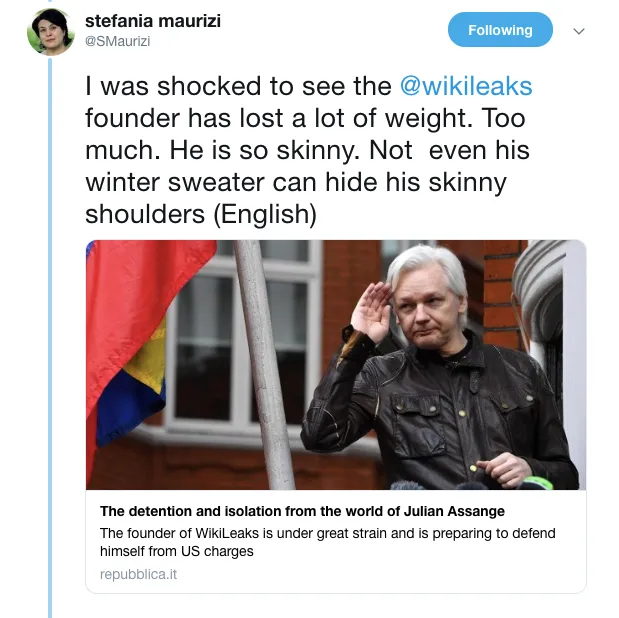
Unfortunately, it goes without saying that the intense irony of Cadwalladr and Harding's reporting, as well as their respective Twitter statements, is utterly lost on the legacy press journalists. They whinge about being criticized for inaccurate reporting they refuse to correct. They scream on social media at other establishment press outlets for "providing a platform to a liar," so blind to their own bullshit that they don't see the irony in their complaint.
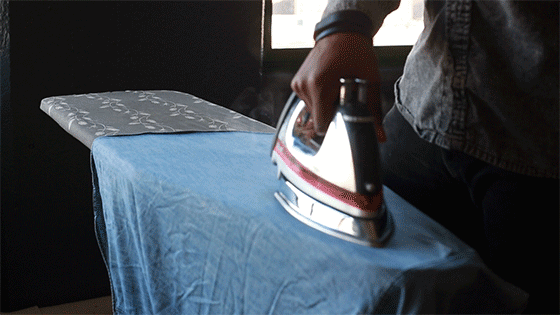
It would be amusing if it wasn't so serious. The MI6 apologists project onto others the deception they commit, deliberately deceiving and manipulating the public via their own platform at the Guardian and on social media. Assange, unlike Harding and Cadwalladr, cannot answer the lies spread about him on Twitter.
Nonetheless, the pair and their ilk hurl fictionalized accusations at the gagged fellow journalist who is in solitary confinement, who is being starved to death, and who has is being prosecuted by the US and UK deep state for the crime of accurate reporting, an act that Cadwalladr and Harding need never fear being persecuted for.
Given the absolute lack of self-awareness demonstrated in Harding's exchange with journalists like Aaron Mate, one might conclude that propagandizing the public is the conscious intent of their work.
The contrast between figures like Assange and establishment journalists does not end with their vastly different predicaments and their ability to speak out in their own defense. The gulf between them is deepened further in the context of Assange's own actions over time.
As noted by his supporters, Assange has consistently fought for the rights of others, especially those with less power than himself. Just days before the Ecuadorian government cut off Assange's access to the outside world, he called for Twitter to reinstate the account of vindicated activist Lauri Love, who had at the time just avoided extradition to the US from the UK.
That singular example is one of many of the more well-known instances of similar works, including Assange's continual support for Chelsea Manning and Edward Snowden.
What does all of this tell us? As Craig Murray put it:
"Assange is not a whistleblower or a spy – he is the greatest publisher of his age, and has done more to bring the crimes of governments to light than the mainstream media will ever be motivated to achieve. That supposedly great newspaper titles like the Guardian, New York Times and Washington Post are involved in the spreading of lies to damage Assange, and are seeking his imprisonment for publishing state secrets, is clear evidence that the idea of the “liberal media” no longer exists in the new plutocratic age. The press are not on the side of the people, they are an instrument of elite control."